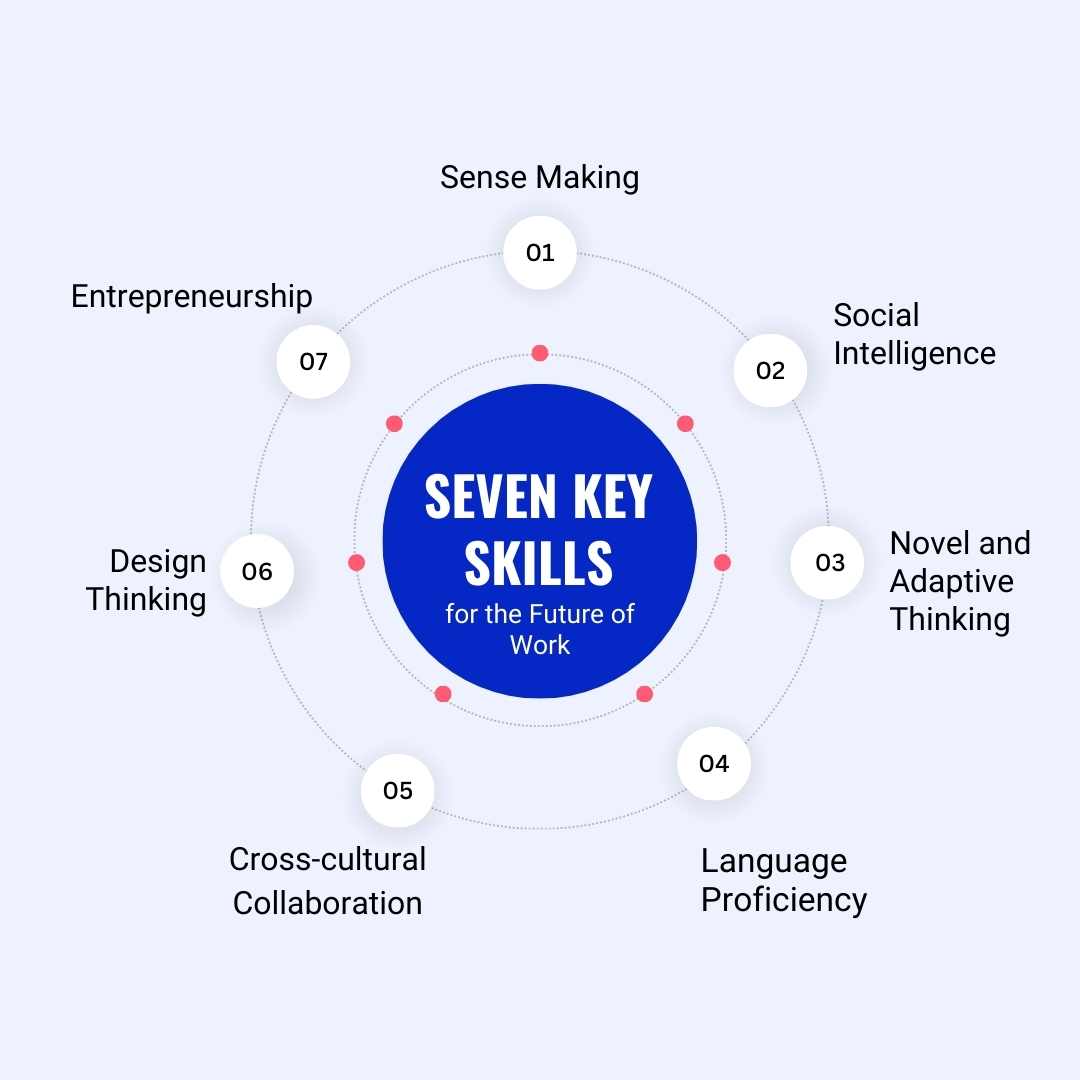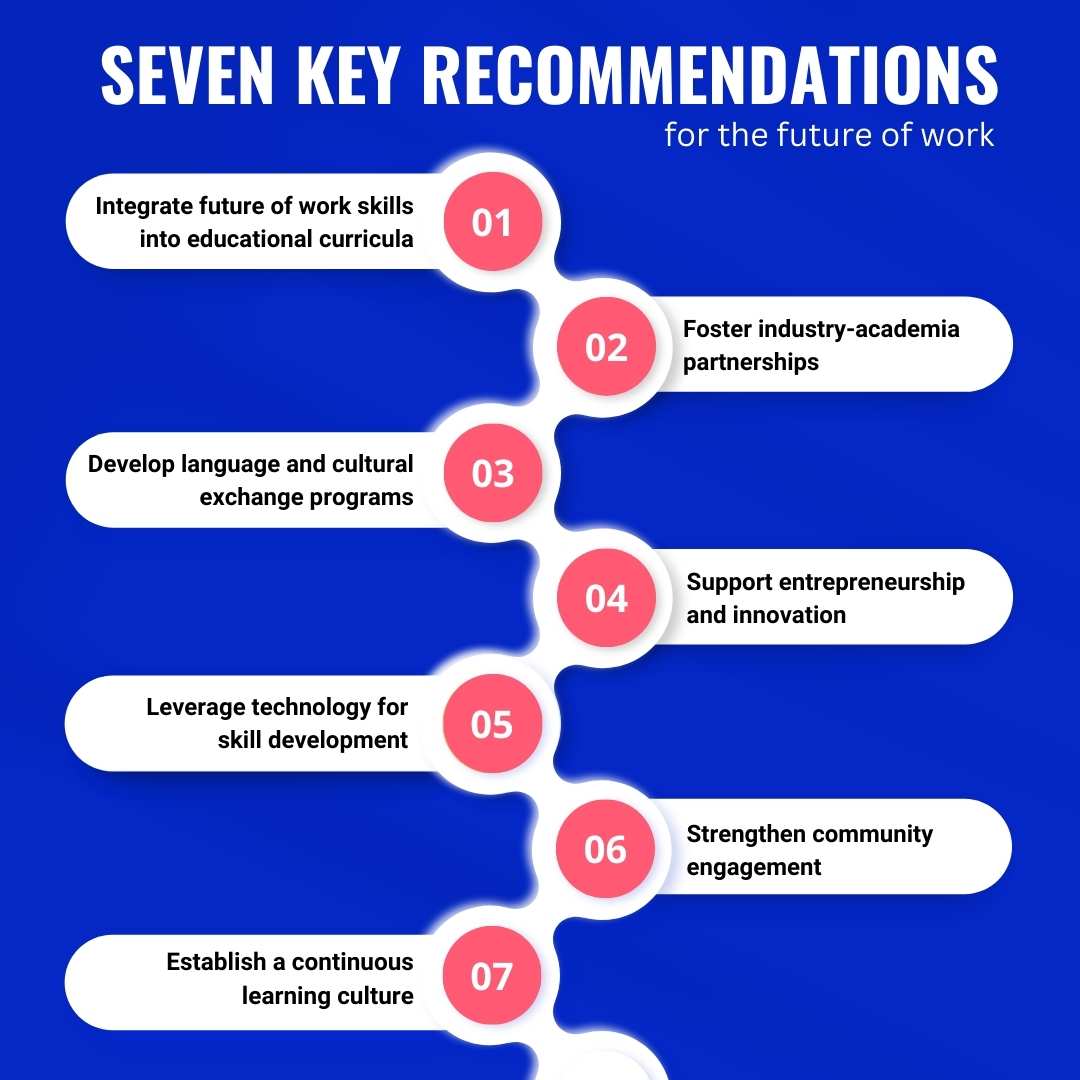


The tribal and indigenous people of North-East India have adapted to 230 years of industrial revolutions in just one generation. Our ability to embrace the challenges and opportunities of this unique and rapid transformation makes the region a compelling investment destination. We find ourselves amidst the Fourth Industrial Revolution, characterized by the fusion of physical, digital, and biological technologies, such as artificial intelligence, robotics, and biotechnology. There is a significant shift in the jobs landscape due to AI and Automation, and it presents us with an opportunity to reshape the future of work in North-East India. The truth is, the future of work is already here, and it is our collective responsibility to ensure that we harness the potential of these groundbreaking technologies.
In order to adapt to this rapidly changing landscape, it is essential for businesses, governments, and individuals to collaborate and invest in skill development, education, and innovation. By nurturing a workforce equipped with the necessary digital literacy, critical thinking, and problem-solving skills, we can ensure that the benefits of AI and Automation are shared by all and that people are not left behind in this technological revolution.
I present seven essential future of work skills and explore how North-East India’s unique context nurtures their development

Sense-making is the ability to understand complex, ambiguous, or contradictory information and make sense of it in a coherent and meaningful way. It involves connecting the dots, identifying patterns, and discerning the underlying structures in data or situations. In the future of work in North-East India, sense-making skills will be crucial for navigating the rapidly changing work environment and making informed decisions amidst uncertainty.
Social intelligence refers to the ability to effectively understand and navigate social situations, including the recognition and interpretation of others’ emotions, motivations, and behaviours. It involves empathy, active listening, and effective communication, as well as the capacity to build and maintain relationships. In the future of work in North-East India, social intelligence will be essential for collaboration, teamwork, and leadership roles, which are less likely to be automated.
Novel and adaptive thinking is the ability to think creatively and adapt to new situations, technologies, or challenges. It involves generating innovative solutions, learning from experience, and adjusting one’s approach in response to changes in the work environment. In the future of work in North-East India, novel and adaptive thinking skills will be necessary to stay competitive and excel in an ever-evolving job market.
Language proficiency refers to the ability to effectively communicate in one or more languages. In the future of work in North-East India, being proficient in multiple languages can open doors to new opportunities and collaborations, especially as businesses become more globalized.
Cross-cultural collaboration involves working effectively with people from diverse cultural backgrounds. It requires understanding and appreciating cultural differences, as well as adapting one’s communication and work styles to accommodate those differences. In the future of work in North-East India, cross-cultural collaboration will be essential for engaging in global business environments and working with diverse teams.
Design thinking is a problem-solving approach that involves empathy, experimentation, and iteration to develop innovative solutions. It encourages a human-centred perspective, focusing on understanding the needs of users and creating products, services, or processes that address those needs. In the future of work in North-East India, design thinking skills will be valuable for generating creative solutions and fostering innovation across various industries.
Entrepreneurship refers to the ability to identify business opportunities, create new ventures, and manage them effectively. It involves skills such as business planning, marketing, financial management, and risk assessment. In the future of work in North-East India, entrepreneurship skills will be important not only for launching start-ups but also for contributing to the growth and innovation of existing organizations.
Despite embracing rapid industrial transformations, certain challenges persist that can hinder progress.
Firstly, let me address the issue of inadequate infrastructure. Limited internet connectivity, particularly in rural areas, restricts the development of digital literacy and technology skills. Access to quality education and training facilities remains a challenge. Lack of adequate power supply is a major deterrent to the development of industry.
Secondly, the region’s geographic isolation and challenging terrain make it difficult for the people to access opportunities. This isolation also poses challenges in attracting investment, forging partnerships, and integrating with global markets.
Lastly, we cannot overlook the socio-economic and political complexities. The region has a history of socio-political unrest and conflict, affecting stability and security. The diverse ethnic, linguistic, and cultural background further complicates the design and implementation of cohesive skill development programs.
However, our unique history and context have given rise to key attributes that can help nurture these 7 key future of work skills.

These skills are critical for individuals and organizations to navigate the complexities of the modern work environment and remain competitive amidst technological disruption, changing market demands, and the evolving nature of work. North-East India’s historical, cultural, and political context offers a fertile ground for cultivating these skills, characterised by these seven attributes:
North-East India is home to over 200 ethnic groups, each with its own language, customs, and traditions. This rich cultural diversity fosters a sense of openness to new ideas and perspectives, encouraging creativity and innovation among the people. This openness is crucial for skills such as sense-making, design thinking, and novel and adaptive thinking, as it allows individuals to approach problems from various angles, appreciate different viewpoints, and develop innovative solutions. In an era of AI and automation, the ability to generate unique ideas and think outside the box becomes a significant competitive advantage.
Historically, the North-East region has faced numerous challenges, including geographic isolation, political instability, and limited economic development. The people’s ability to adapt and remain resilient amidst these challenges is a testament to their innate flexibility and adaptability. This adaptability is vital for novel and adaptive thinking, as well as for the ability to learn new skills and embrace new technologies. As AI and automation continue to reshape the job market, the inherent resilience and adaptability of the North-Eastern workforce can help us navigate these changes and stay relevant.
The close-knit social structures and strong community values and shared challenges in North-East India foster a sense of empathy, understanding, and collaboration among the people. These cultural aspects nurture social intelligence, as individuals are accustomed to working collaboratively and empathizing with others. In a world increasingly dominated by AI and automation, human interaction and the ability to understand and manage emotions remain essential aspects of many job roles, giving the North-Eastern workforce a competitive edge.
Education has always been a priority in the North-East, with several states having literacy rates above the national average. This emphasis on education and skill development aligns well with the need for sense-making, design thinking, and novel and adaptive thinking in the future job market. Furthermore, prestigious educational institutions like the Indian Institutes of Technology (IIT) in Guwahati and the National Institutes of Technology (NITs) in various North-Eastern states contribute to the development of a highly skilled workforce, well-equipped to navigate the challenges posed by AI and automation.
The governments of North-Eastern states have been proactive in implementing policies and initiatives that promote skill development. By investing in skill development, the North-East region can create a talent pool capable of thriving in a rapidly changing job market and staying ahead of AI and automation.
North-East India has a long tradition of entrepreneurship, particularly in the areas of handicrafts, agriculture, and small-scale industries. This ingrained entrepreneurial spirit can be harnessed to drive innovation and business growth in emerging sectors like IT and technology. Entrepreneurship skills, such as business planning, marketing, and financial management, are valuable for both launching start-ups and contributing to existing organizations. By fostering entrepreneurship, our region can create new businesses.
English is widely spoken and understood in North-East India, making the workforce well-equipped to communicate and collaborate in global business environments. This language proficiency, combined with the region’s linguistic diversity, further enhances the workforce’s ability to work effectively with diverse teams and adapt to different cultural contexts. Language proficiency and cross-cultural collaboration skills are essential in a globalized world and can help the North-Eastern workforce excel in roles that require human interaction, cultural understanding, and negotiation skills, which are less prone to automation.
To capitalise on the fertile soil and conditions that may nurture the skills for the future of work in North-East India, we must address some challenges.
First, we need to secure the financial resources and infrastructure investments necessary to support skill development programs. This requires effective collaboration between the government, private sector, educational institutions, and local communities. We must create a unified vision for skill development in the region, ensuring seamless coordination among all stakeholders.
Change is not always easy, and some may be reluctant to embrace new ways of working. We must foster a culture of continuous learning and adaptability in the face of rapid technological advancements and changing industry demands. This requires sustained effort and commitment from all of us.
At the same time, we must address the challenge of retaining local talent and providing attractive employment options and career prospects within the region. We need to ensure inclusivity and equal access to opportunities for all members of society, considering the region’s diverse ethnic, linguistic, and cultural backgrounds.
As we nurture the future of work skills, it is important to strike a balance between preserving traditional knowledge, arts, and crafts, and promoting modern skills like technology and innovation. This balance is essential for fostering a sense of pride and identity among the local population. The social intelligence and strong community values inherent in the North East are advantageous keys to holding this balance.

As we address these challenges, we can harness the potential of our region and address the challenges posed by AI and Automation. Collaboration and investment in skill development, education, and innovation are essential to ensure the benefits of these groundbreaking technologies reach all. I propose the following 7 recommendations can take to ensure our region continues to adapt to this rapid industrial revolution.
Incorporate sense-making, social intelligence, novel and adaptive thinking, language proficiency, cross-cultural collaboration, design thinking, and entrepreneurship into the educational curricula at schools, colleges, and vocational training centres. Collaborate with local and international organizations to ensure these programs are relevant and tailored to the region’s unique context.
Establish partnerships between educational institutions, businesses, and industries to create skill development programs aligned with industry needs. These collaborations can help identify the demand for specific future of work skills and facilitate practical, hands-on learning experiences for students, preparing them for the evolving job market.
Promote language and cultural exchange programs within the region and abroad to enhance language proficiency and cross-cultural collaboration skills. Encourage students and professionals to participate in these programs to develop their communication abilities and cultural understanding, preparing them for global work environments.
Create incubators, accelerators, and co-working spaces for entrepreneurs and innovators to help them develop and refine their ideas. Provide mentorship, networking opportunities, and access to resources to encourage entrepreneurship and the application of design thinking, enabling the creation of new businesses and jobs in the region.
Use digital platforms and e-learning tools to deliver skill development programs, providing access to quality education and resources in rural and remote areas. Promote digital literacy and technology skills as an integral part of these initiatives to encourage novel and adaptive thinking.
Encourage community engagement and collaboration by organizing workshops, seminars, and events that focus on nurturing future of work skills. These activities can foster social intelligence, sense-making, and a shared understanding of the region’s unique context, assets, and challenges.
Promote a culture of lifelong learning by offering flexible and accessible learning opportunities, such as online courses, skill development workshops, and professional development programs. This approach will help individuals stay updated with the latest industry trends, ensuring their skills remain relevant and adaptable in the face of AI and automation.
The rich cultural diversity, resilience, and community values of the people in North-East India further contribute to their ability to remodel to the rapidly changing job market. Moreover, the region’s strong entrepreneurial spirit and exposure to global influences, owing to its proximity to international neighbours, foster an open-minded and innovative environment that is essential for success in the Future of work in North-East India.
As we collectively navigate the challenges and opportunities presented by AI and Automation, we must invest to adapt to the challenges set before us by the Fourth Industrial Revolution. By doing so, we will not only support economic growth and global competitiveness but also contribute to the development of a resilient and future-ready workforce, capable of leading the world towards a brighter, more sustainable tomorrow.
Kevisato Sanyü
Founder, NagaEd
kevisato@nagaed.com
NagaEd is a leading digital education company that provides learning and teaching solutions for students, teachers and institutions through modern and digitally enabled educational experience. We create a learning society where all Nagas are provided equal opportunity to access quality education resources.
